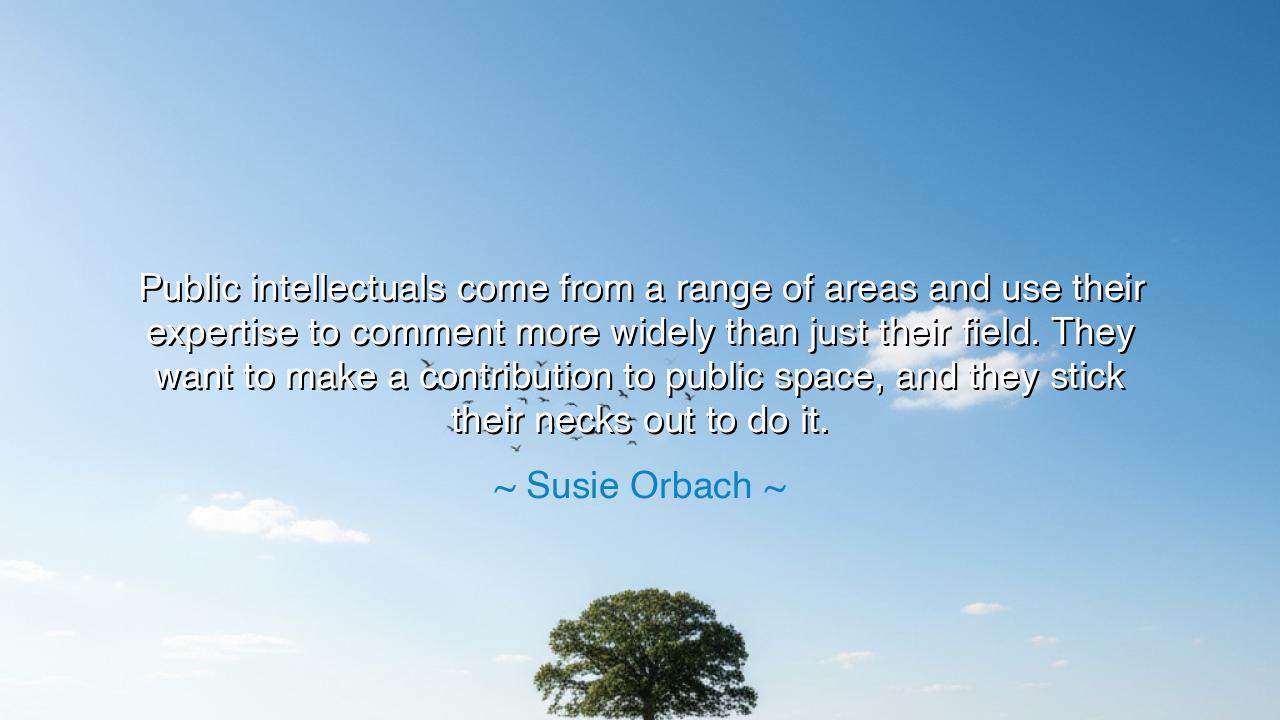
Public intellectuals come from a range of areas and use their
Public intellectuals come from a range of areas and use their expertise to comment more widely than just their field. They want to make a contribution to public space, and they stick their necks out to do it.






Hear, O seeker of wisdom, the words of Susie Orbach, who declared: “Public intellectuals come from a range of areas and use their expertise to comment more widely than just their field. They want to make a contribution to public space, and they stick their necks out to do it.” These words remind us that the role of the public intellectual is not to remain cloistered in the narrow halls of their profession, but to step boldly into the open arena, to risk themselves in the service of truth, and to speak not only to the few but to the many. It is a call to courage, for in every age, the voice that dares to rise above the crowd invites both praise and peril.
For what is a public intellectual but one who wields knowledge as a lantern for all, not as a private torch for the few? The scholar in silence, the thinker in solitude, may guard the treasure of wisdom—but unless he steps into the public space, his wisdom remains buried, unseen, unshared. Orbach’s words remind us that those who step forth risk misunderstanding, ridicule, and even persecution, yet without their courage, society remains blind. To stick one’s neck out is to hazard the blow of criticism, but it is also to lift one’s head high so that others may see the light of truth.
History is filled with such figures. Consider Socrates, who walked the streets of Athens not to impress the learned but to question the ordinary man, challenging him to examine life and truth. He did not confine himself to philosophy’s narrow circle, but made himself a gadfly to the whole city. For this, he was condemned, forced to drink the hemlock. Yet his voice lives on because he dared to speak beyond his field, beyond safety, into the heart of the public square. Socrates embodies the warning and the glory of Orbach’s insight: to be a public intellectual is to risk death, but also to plant seeds that no death can destroy.
Or look to George Orwell, who with pen as his sword exposed the dangers of totalitarianism. He was no mere novelist locked in imagination; he became a voice for political truth, revealing the corruption of power and the fragility of freedom. His works, such as 1984 and Animal Farm, were not confined to literature but bled into politics, ethics, and society. Orwell stuck his neck out, challenging tyrants and awakening minds. His example teaches us that when the intellectual steps into the public arena, the words become more than ideas—they become weapons for justice.
The meaning of Orbach’s words, then, is not limited to the famous alone. Each of us, in our own measure, is called to bring forth our expertise, our knowledge, our lived truth, into the larger conversation of our time. To remain silent is safe, but it is also barren. To speak is dangerous, but it is fruitful. The public space needs voices that are informed, courageous, and compassionate—voices that can cut through noise with clarity, and through fear with hope.
Yet the path of the public intellectual demands humility. For to speak to all, one must listen to all. To use knowledge rightly is not to impose it as a tyrant, but to offer it as a servant of the common good. Those who wield their expertise arrogantly soon find themselves rejected; but those who bring it as gift and contribution are remembered as guides and guardians of their people. Thus, the calling is noble but perilous: one must balance courage with care, boldness with humility.
So, O listener, take this lesson: whatever field you labor in, whatever knowledge you possess, do not hoard it. Step forth into your community, your nation, your world, and make your voice heard. Speak truth where lies abound, share wisdom where ignorance reigns, offer guidance where confusion spreads. Be willing to stick your neck out, not for vanity, but for service, not for pride, but for the sake of others. In doing so, you walk in the path of the ancients, you join the lineage of those who carried wisdom into the public square, and you become not only a thinker, but a builder of the future.
So let Orbach’s words ring in your heart: the public intellectual is the guardian of the common space. Be bold enough to step into it. Be humble enough to serve within it. And be wise enough to know that in risking your voice, you may give light to countless others who walk in the dark.






AAdministratorAdministrator
Welcome, honored guests. Please leave a comment, we will respond soon